UNIT 11 CONFLICT AND COMPROMISE LESSON 1 Living In a Community课件5(共38张PPT,内镶嵌视频)-高中英语北师大版(2019)选择性必修
文档属性
| 名称 | UNIT 11 CONFLICT AND COMPROMISE LESSON 1 Living In a Community课件5(共38张PPT,内镶嵌视频)-高中英语北师大版(2019)选择性必修 |
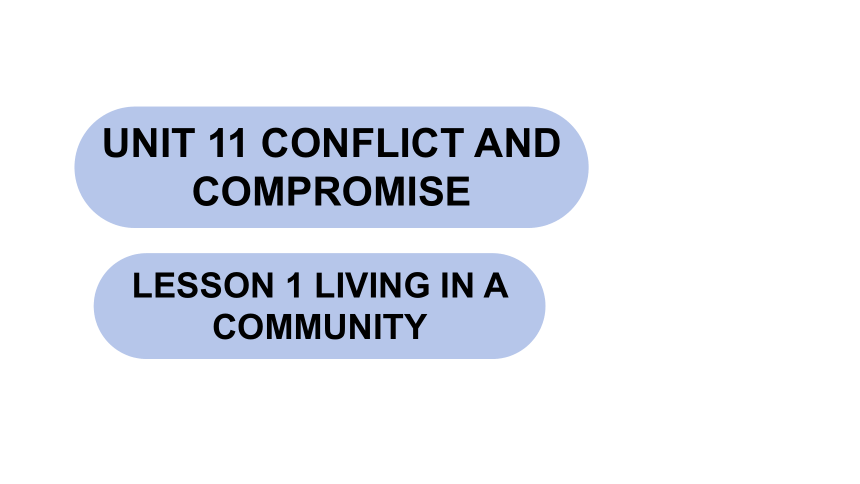
|
|
| 格式 | pptx | ||
| 文件大小 | 54.7MB | ||
| 资源类型 | 教案 | ||
| 版本资源 | 北师大版(2019) | ||
| 科目 | 英语 | ||
| 更新时间 | 2025-04-01 19:50:29 | ||
图片预览

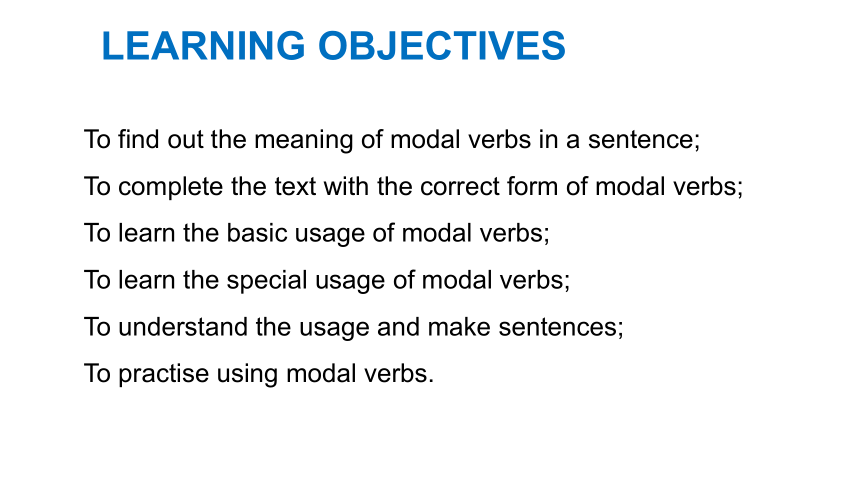
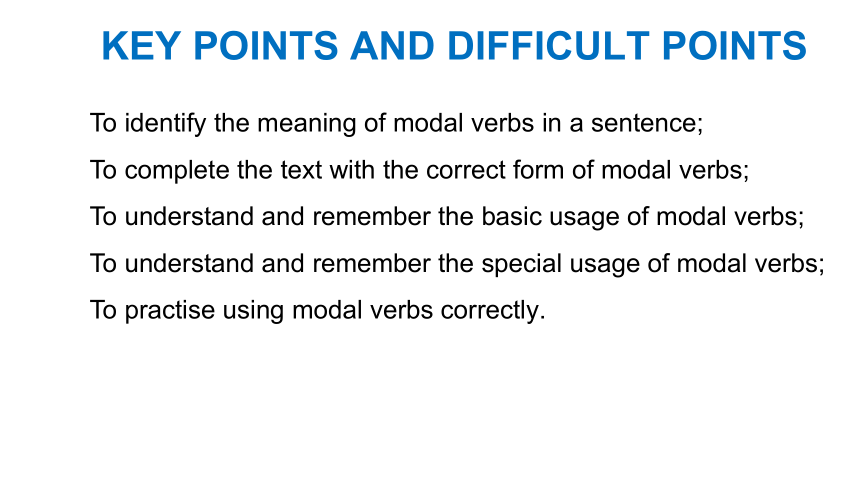
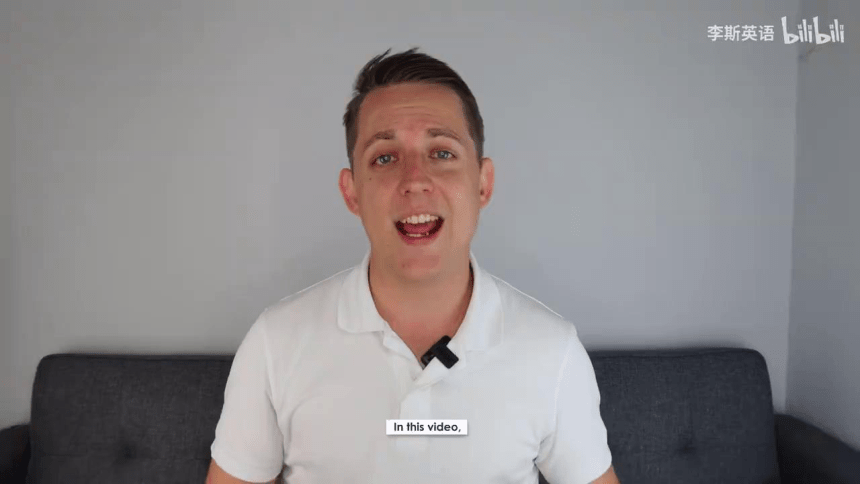
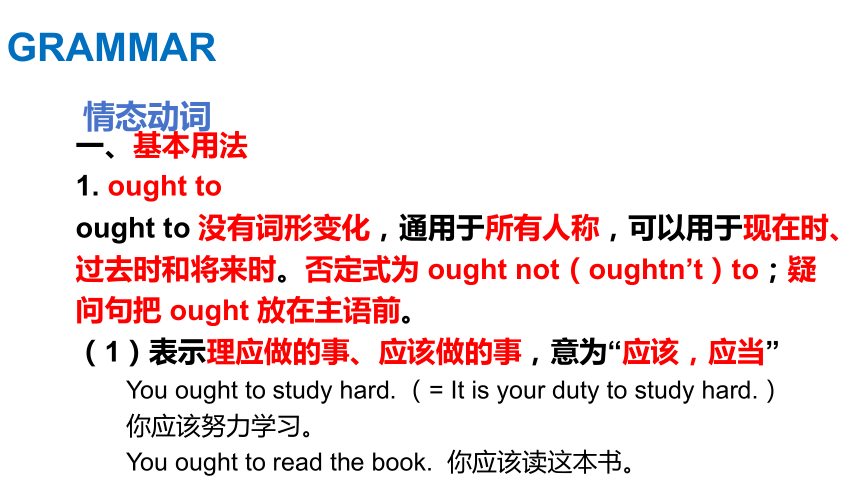
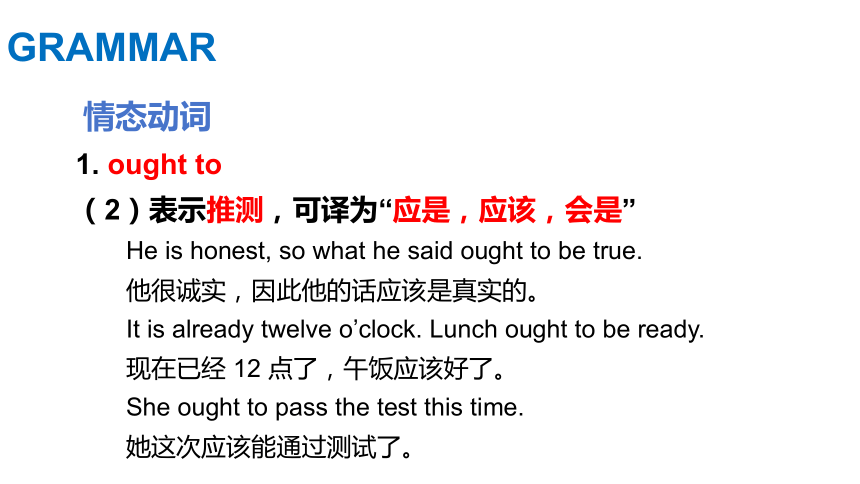
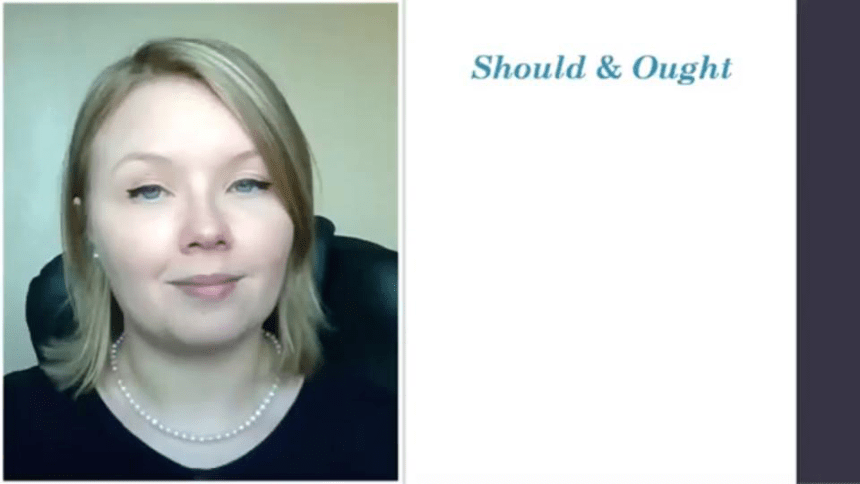
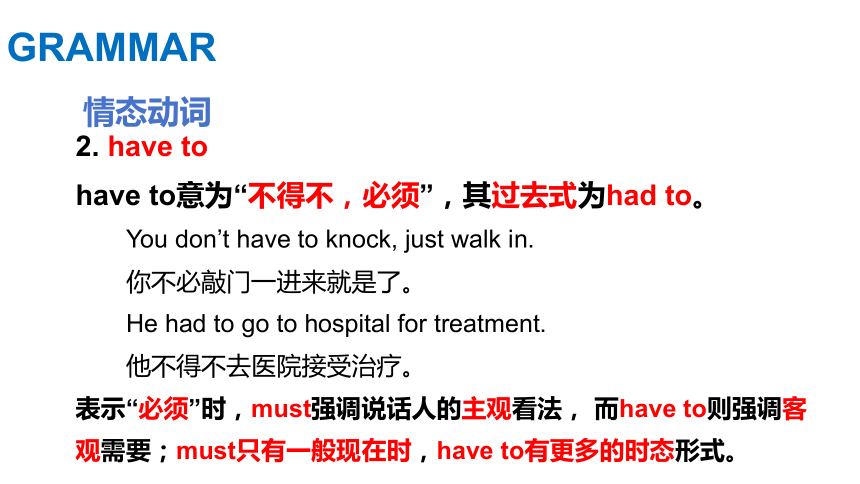
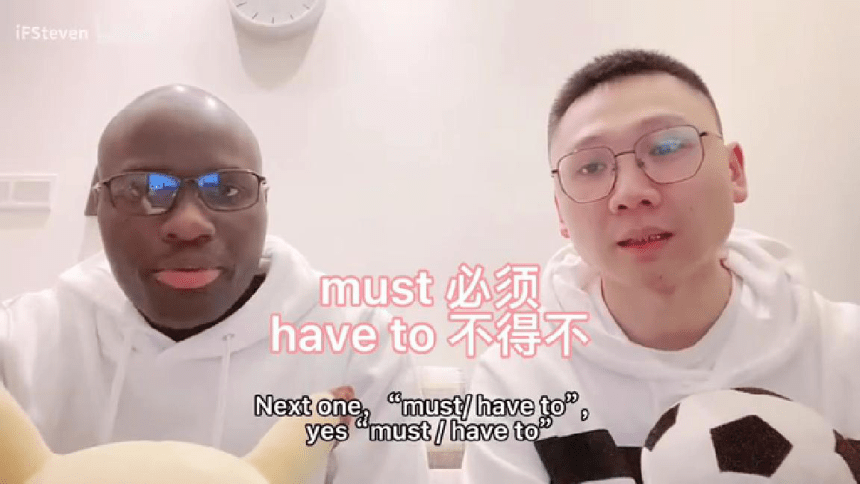
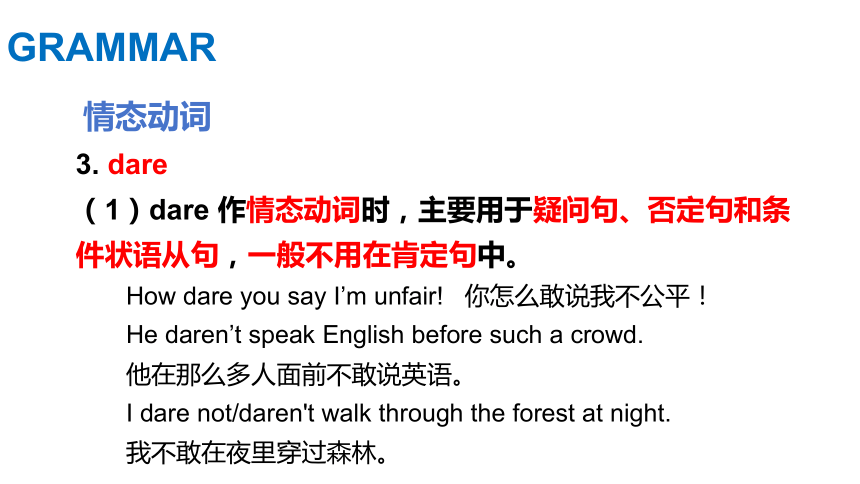
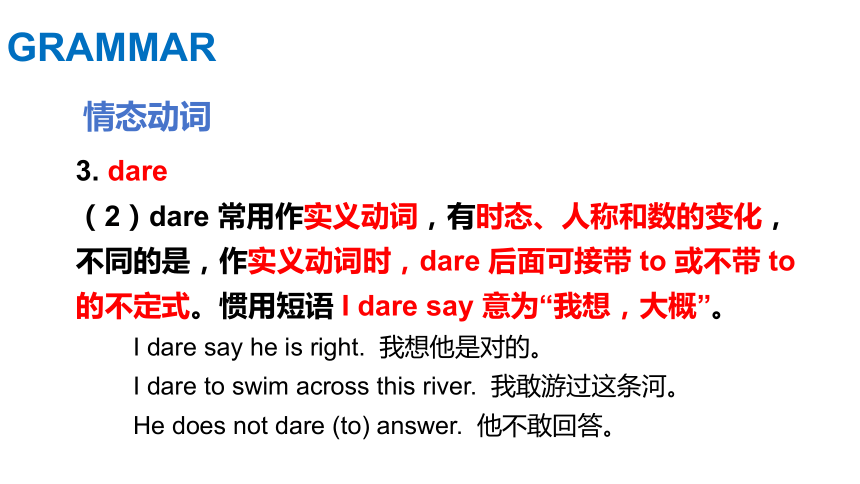
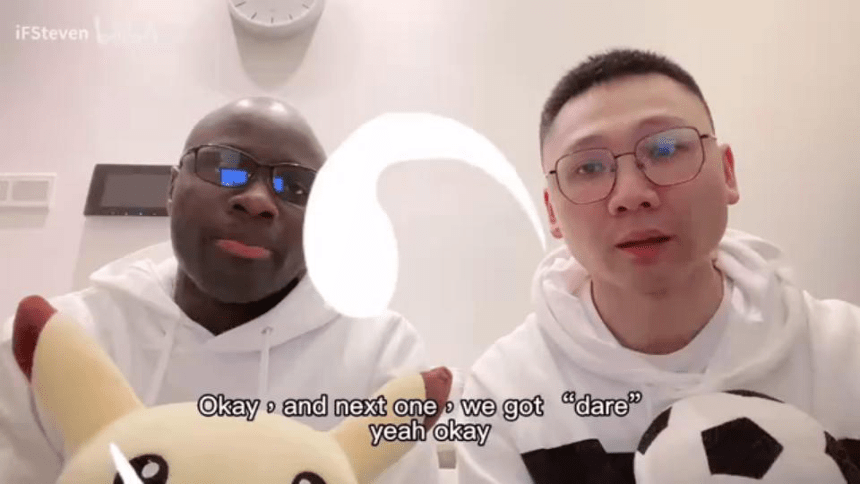
文档简介
(共38张PPT)
LESSON 1 LIVING IN A COMMUNITY
UNIT 11 CONFLICT AND COMPROMISE
LEARNING OBJECTIVES
To find out the meaning of modal verbs in a sentence;
To complete the text with the correct form of modal verbs;
To learn the basic usage of modal verbs;
To learn the special usage of modal verbs;
To understand the usage and make sentences;
To practise using modal verbs.
KEY POINTS AND DIFFICULT POINTS
To identify the meaning of modal verbs in a sentence;
To complete the text with the correct form of modal verbs;
To understand and remember the basic usage of modal verbs;
To understand and remember the special usage of modal verbs;
To practise using modal verbs correctly.
GRAMMAR
情态动词
一、基本用法
1. ought to
ought to 没有词形变化,通用于所有人称,可以用于现在时、过去时和将来时。否定式为 ought not(oughtn’t)to;疑问句把 ought 放在主语前。
(1)表示理应做的事、应该做的事,意为“应该,应当”
You ought to study hard. (= It is your duty to study hard.)
你应该努力学习。
You ought to read the book. 你应该读这本书。
GRAMMAR
情态动词
1. ought to
(2)表示推测,可译为“应是,应该,会是”
He is honest, so what he said ought to be true.
他很诚实,因此他的话应该是真实的。
It is already twelve o’clock. Lunch ought to be ready.
现在已经 12 点了,午饭应该好了。
She ought to pass the test this time.
她这次应该能通过测试了。
GRAMMAR
情态动词
2. have to
have to意为“不得不,必须”,其过去式为had to。
You don’t have to knock, just walk in.
你不必敲门一进来就是了。
He had to go to hospital for treatment.
他不得不去医院接受治疗。
表示“必须”时,must强调说话人的主观看法, 而have to则强调客观需要;must只有一般现在时,have to有更多的时态形式。
GRAMMAR
情态动词
3. dare
(1)dare 作情态动词时,主要用于疑问句、否定句和条件状语从句,一般不用在肯定句中。
How dare you say I’m unfair! 你怎么敢说我不公平!
He daren’t speak English before such a crowd.
他在那么多人面前不敢说英语。
I dare not/daren't walk through the forest at night.
我不敢在夜里穿过森林。
GRAMMAR
情态动词
3. dare
(2)dare 常用作实义动词,有时态、人称和数的变化,不同的是,作实义动词时,dare 后面可接带 to 或不带 to 的不定式。惯用短语 I dare say 意为“我想,大概”。
I dare say he is right. 我想他是对的。
I dare to swim across this river. 我敢游过这条河。
He does not dare (to) answer. 他不敢回答。
GRAMMAR
情态动词
4. need
(1)need 可以作情态动词,need 和动词原形构成复合谓语,通常用于否定句、疑问句或条件句中,无人称和数的变化。
You needn't do it again. 你不需要再做了。
He needn't worry about it. 这件事他无需担心。
You need not tell the entire truth, but you must not lie.
你不必说出全部真相,但你一定不许撒谎。
GRAMMAR
情态动词
4. need
(2)need 也可以作实义动词,用于肯定句、疑问句和否定句中。need后跟不定式或名 / 代词作宾语,有人称和数的变化,其变化与一般动词相同。
I need some help. 我需要一些帮助。
She needs to see a doctor. 她需要去看医生。
We need to finish this project by the end of the week.
我们需要在本周末之前完成这个项目。
GRAMMAR
情态动词
4. need
(3)回答“Need I... ”时,肯定回答用“Yes,you must.”,否定回答用“No,you needn’t/don’t need to/don’t have to.”。
-Need I pay a certain amount of money to use your telephone 用一用你的电话,我需要付一定数量的钱吗?
-Yes, you must./No, you needn’t/ don’t need to/ don’t have to. 是的,你必须付。/ 不,你不必付。
GRAMMAR
情态动词
4. need
(4)回答“Must I... ”时,肯定回答用“Yes,you must.”,否定回答用“No,you needn’t/don’t need to/don’t have to.”。
-Must I hand in my application today
今天我必须交上申请表吗?
-Yes, you must./ No, you needn’t/don’t need to/don’t have to. 是的,你必须交。/ 不,你不必交。
FOCUS ON LANGUAGE: MODAL VERBS
Find out what the modal verb in each sentence means.
a. It is necessary to do this (there is no choice).
b. It is not necessary to do this (there is some choice).
c. It is impossible to do this.
d. It is risky or dangerous to do this.
e. It is sensible to do this.
FOCUS ON LANGUAGE: MODAL VERBS
Find out what the modal verb in each sentence means.
1. Ma Ming...had to pack his bags. ( )
2. They couldn't relax or read a book without plugging their ears. ( )
3. We told him that he ought to cease drumming or leave the property... ( )
4. ...and I don't have to do my own washing! ( )
5. ...we dared not go onto our balcony... ( )
a
c
e
b
d
FOCUS ON LANGUAGE: MODAL VERBS
Complete the text with the correct form of could, have to, ought to or dare not (to).
My good friend, Kathy, is a hard-working person. She shared a flat with me ten months ago. At that time, she was preparing for an important exam. During the day, she 1. __________ go to work. So she 2. __________ only study in the evening. To help her get focused, I 3. _______________ turn on the TV loud as
had to
could
dared not
FOCUS ON LANGUAGE: MODAL VERBS
Complete the text with the correct form of could, have to, ought to or dare not (to).
she always studied late. I think she 4. _______________ have enough sleep. Now Kathy has passed the exam and moved out to live near her new company. Surprisingly, I sometimes feel afraid to be alone in the flat at night and 5. _____________ sleep without the light on now.
ought to
dare not
GRAMMAR
情态动词
二、特殊用法
1. must 表示“偏要”“硬要”,表示说话人对句子主语所发出的动作或行为是不希望的、不满的甚至是生气的。
-Can I smoke here 我可以在这里吸烟吗?
-No, it’s not allowed. If you must, please go to the smoking room.
不可以,这里不允许。如果你非要吸烟,请到吸烟室。
GRAMMAR
情态动词
二、特殊用法
2. should 表示可能性、推测或推论,有“可能;该”等意思;还可译为“竟然”,表示惊讶、不以为然等情绪。
-When can I get the photos 我何时来拿照片?
-The photo should be ready by 5 o’clock this afternoon. 照片今天下午五点应该会准备好的。
You can’t imagine that such a good student like him should fail in the exam. 你无法想象像他这样的好学生竟然考试不及格。
GRAMMAR
情态动词
二、特殊用法
3. will 可以用在 if 从句中表示各种“愿望”,包括“请求,意愿,同意,允许,能够,坚持,选择,计划”等。
If you will come into the hall, the meeting will begin soon.
请到大厅里来,会议马上开始了。
If you will make another try, I shall do everything possible to help you.
如果你愿意再试一次的话,我愿尽一切可能帮助你。
GRAMMAR
情态动词
三、“情态动词 + have done”的用法
1. 表示对过去情况的推测
(1)肯定推测
① must have done 肯定做过某事
She must have done a lot of work on it.
她一定在这上面花了不少功夫。
He must have stayed up last night. He seemed tired.
他昨晚肯定熬夜了,他看起来很疲倦。
GRAMMAR
情态动词
三、“情态动词 + have done”的用法
② should have done(按道理或义务)应该做过某事
I should have done just the same thing in your place.
我处在你的地位也会做同样的事情的。
③ might have done 也许做过某事(可能性极小)
It might have rained last night, for the ground is still damp.
昨晚可能下雨了,因为地面还是潮湿的。
GRAMMAR
情态动词
三、“情态动词 + have done”的用法
1. 表示对过去情况的推测
(2)否定推测
① can’t/ couldn’t have done 不可能做过……
I think that he couldn’t/can't have gone abroad. I saw him just now.
我认为他不可能出国了.我刚才还看见他了。
GRAMMAR
情态动词
三、“情态动词 + have done”的用法
1. 表示对过去情况的推测
(2)否定推测
② might not have done 也许没做过……
He might not have attended the meeting because he was busy with other tasks.
他可能没有参加会议,因为他忙于其他任务。
GRAMMAR
情态动词
三、“情态动词 + have done”的用法
1. 表示对过去情况的推测
(3)疑问推测
① Could sb. have done sth. 某人可能做过……吗?
Could he have finished the project earlier
他可能早点完成项目吗?
Could he have been a great musician
他可能成为一位伟大的音乐家吗?
GRAMMAR
情态动词
三、“情态动词 + have done”的用法
1. 表示对过去情况的推测
(3)疑问推测
② Might sb. have done sth. 某人会不会做过……?
Might he have done his homework already
他会不会已经做完作业了?
Might they have left already 他们会不会已经离开了?
GRAMMAR
情态动词
三、“情态动词 + have done”的用法
2. 表示表示对过去事情的抱怨或后悔
(1)should have done 本来应该做而没有做
I told you we should have done it my way!
我跟你说过我们原本应该用我的方法来做这事!
I'm doing something I should have done a long time ago.
我会做一件我早就该做的事情。
GRAMMAR
情态动词
三、“情态动词 + have done”的用法
2. 表示表示对过去事情的抱怨或后悔
(2)could have done 本来能够做而没有做
Given more time, we could have done it better.
倘若给我们会把它做得更好。
He thought she could have done better, by far.
他认为她本可以演得更好,而且是好得多。
GRAMMAR
情态动词
三、“情态动词 + have done”的用法
2. 表示表示对过去事情的抱怨或后悔
(3)need have done 本需要做但没有做
You need have cleaned your room before going out to play.
你出去玩之前本应该打扫房间的。
You need have read this book before the discussion.
讨论之前你本应该读这本书的。
GRAMMAR
情态动词
三、“情态动词 + have done”的用法
2. 表示表示对过去事情的抱怨或后悔
(4)would like to have done 本想做但没有做
I would like to have done it. 我本想把这件事做完。
I would like to have gone to the concert with you. A friend of mine called on me.
我本来想和你一起去听音乐会,但我的一个朋友来了。
PRACTICE
1. Maybe we ________________ go down to the library and check it out.
2. You could get into a situation where you ________________ decide immediately.
3. I ________________ say that the computer would provide a clear answer to that.
4. Actually, you _________________ tell me anything if you don't want to.
ought to
have to
dare
needn't
PRACTICE
5. It couldn't have been me—it _______________________ (be) someone else.
6. I can’t find my purse. I _____________________ (leave) it in the grocery yesterday, but I’m not sure.
7. You ____________________________ (clean) the room. After all, you were on duty yesterday.
8. The soldier _________________________ (enjoy) himself more—it is a perfect day.
must have been
might have left
should have cleaned
can’t have enjoyed
SUMMARY
Find out and identify the meaning of modal verbs in a sentence;
Complete the text with the correct form of modal verbs;
Understand and learn the basic usage of modal verbs;
Understand and learn the special usage of modal verbs;
Understand the usage and make sentences;
Learn and practise using modal verbs.
Thank you
LESSON 1 LIVING IN A COMMUNITY
UNIT 11 CONFLICT AND COMPROMISE
LEARNING OBJECTIVES
To find out the meaning of modal verbs in a sentence;
To complete the text with the correct form of modal verbs;
To learn the basic usage of modal verbs;
To learn the special usage of modal verbs;
To understand the usage and make sentences;
To practise using modal verbs.
KEY POINTS AND DIFFICULT POINTS
To identify the meaning of modal verbs in a sentence;
To complete the text with the correct form of modal verbs;
To understand and remember the basic usage of modal verbs;
To understand and remember the special usage of modal verbs;
To practise using modal verbs correctly.
GRAMMAR
情态动词
一、基本用法
1. ought to
ought to 没有词形变化,通用于所有人称,可以用于现在时、过去时和将来时。否定式为 ought not(oughtn’t)to;疑问句把 ought 放在主语前。
(1)表示理应做的事、应该做的事,意为“应该,应当”
You ought to study hard. (= It is your duty to study hard.)
你应该努力学习。
You ought to read the book. 你应该读这本书。
GRAMMAR
情态动词
1. ought to
(2)表示推测,可译为“应是,应该,会是”
He is honest, so what he said ought to be true.
他很诚实,因此他的话应该是真实的。
It is already twelve o’clock. Lunch ought to be ready.
现在已经 12 点了,午饭应该好了。
She ought to pass the test this time.
她这次应该能通过测试了。
GRAMMAR
情态动词
2. have to
have to意为“不得不,必须”,其过去式为had to。
You don’t have to knock, just walk in.
你不必敲门一进来就是了。
He had to go to hospital for treatment.
他不得不去医院接受治疗。
表示“必须”时,must强调说话人的主观看法, 而have to则强调客观需要;must只有一般现在时,have to有更多的时态形式。
GRAMMAR
情态动词
3. dare
(1)dare 作情态动词时,主要用于疑问句、否定句和条件状语从句,一般不用在肯定句中。
How dare you say I’m unfair! 你怎么敢说我不公平!
He daren’t speak English before such a crowd.
他在那么多人面前不敢说英语。
I dare not/daren't walk through the forest at night.
我不敢在夜里穿过森林。
GRAMMAR
情态动词
3. dare
(2)dare 常用作实义动词,有时态、人称和数的变化,不同的是,作实义动词时,dare 后面可接带 to 或不带 to 的不定式。惯用短语 I dare say 意为“我想,大概”。
I dare say he is right. 我想他是对的。
I dare to swim across this river. 我敢游过这条河。
He does not dare (to) answer. 他不敢回答。
GRAMMAR
情态动词
4. need
(1)need 可以作情态动词,need 和动词原形构成复合谓语,通常用于否定句、疑问句或条件句中,无人称和数的变化。
You needn't do it again. 你不需要再做了。
He needn't worry about it. 这件事他无需担心。
You need not tell the entire truth, but you must not lie.
你不必说出全部真相,但你一定不许撒谎。
GRAMMAR
情态动词
4. need
(2)need 也可以作实义动词,用于肯定句、疑问句和否定句中。need后跟不定式或名 / 代词作宾语,有人称和数的变化,其变化与一般动词相同。
I need some help. 我需要一些帮助。
She needs to see a doctor. 她需要去看医生。
We need to finish this project by the end of the week.
我们需要在本周末之前完成这个项目。
GRAMMAR
情态动词
4. need
(3)回答“Need I... ”时,肯定回答用“Yes,you must.”,否定回答用“No,you needn’t/don’t need to/don’t have to.”。
-Need I pay a certain amount of money to use your telephone 用一用你的电话,我需要付一定数量的钱吗?
-Yes, you must./No, you needn’t/ don’t need to/ don’t have to. 是的,你必须付。/ 不,你不必付。
GRAMMAR
情态动词
4. need
(4)回答“Must I... ”时,肯定回答用“Yes,you must.”,否定回答用“No,you needn’t/don’t need to/don’t have to.”。
-Must I hand in my application today
今天我必须交上申请表吗?
-Yes, you must./ No, you needn’t/don’t need to/don’t have to. 是的,你必须交。/ 不,你不必交。
FOCUS ON LANGUAGE: MODAL VERBS
Find out what the modal verb in each sentence means.
a. It is necessary to do this (there is no choice).
b. It is not necessary to do this (there is some choice).
c. It is impossible to do this.
d. It is risky or dangerous to do this.
e. It is sensible to do this.
FOCUS ON LANGUAGE: MODAL VERBS
Find out what the modal verb in each sentence means.
1. Ma Ming...had to pack his bags. ( )
2. They couldn't relax or read a book without plugging their ears. ( )
3. We told him that he ought to cease drumming or leave the property... ( )
4. ...and I don't have to do my own washing! ( )
5. ...we dared not go onto our balcony... ( )
a
c
e
b
d
FOCUS ON LANGUAGE: MODAL VERBS
Complete the text with the correct form of could, have to, ought to or dare not (to).
My good friend, Kathy, is a hard-working person. She shared a flat with me ten months ago. At that time, she was preparing for an important exam. During the day, she 1. __________ go to work. So she 2. __________ only study in the evening. To help her get focused, I 3. _______________ turn on the TV loud as
had to
could
dared not
FOCUS ON LANGUAGE: MODAL VERBS
Complete the text with the correct form of could, have to, ought to or dare not (to).
she always studied late. I think she 4. _______________ have enough sleep. Now Kathy has passed the exam and moved out to live near her new company. Surprisingly, I sometimes feel afraid to be alone in the flat at night and 5. _____________ sleep without the light on now.
ought to
dare not
GRAMMAR
情态动词
二、特殊用法
1. must 表示“偏要”“硬要”,表示说话人对句子主语所发出的动作或行为是不希望的、不满的甚至是生气的。
-Can I smoke here 我可以在这里吸烟吗?
-No, it’s not allowed. If you must, please go to the smoking room.
不可以,这里不允许。如果你非要吸烟,请到吸烟室。
GRAMMAR
情态动词
二、特殊用法
2. should 表示可能性、推测或推论,有“可能;该”等意思;还可译为“竟然”,表示惊讶、不以为然等情绪。
-When can I get the photos 我何时来拿照片?
-The photo should be ready by 5 o’clock this afternoon. 照片今天下午五点应该会准备好的。
You can’t imagine that such a good student like him should fail in the exam. 你无法想象像他这样的好学生竟然考试不及格。
GRAMMAR
情态动词
二、特殊用法
3. will 可以用在 if 从句中表示各种“愿望”,包括“请求,意愿,同意,允许,能够,坚持,选择,计划”等。
If you will come into the hall, the meeting will begin soon.
请到大厅里来,会议马上开始了。
If you will make another try, I shall do everything possible to help you.
如果你愿意再试一次的话,我愿尽一切可能帮助你。
GRAMMAR
情态动词
三、“情态动词 + have done”的用法
1. 表示对过去情况的推测
(1)肯定推测
① must have done 肯定做过某事
She must have done a lot of work on it.
她一定在这上面花了不少功夫。
He must have stayed up last night. He seemed tired.
他昨晚肯定熬夜了,他看起来很疲倦。
GRAMMAR
情态动词
三、“情态动词 + have done”的用法
② should have done(按道理或义务)应该做过某事
I should have done just the same thing in your place.
我处在你的地位也会做同样的事情的。
③ might have done 也许做过某事(可能性极小)
It might have rained last night, for the ground is still damp.
昨晚可能下雨了,因为地面还是潮湿的。
GRAMMAR
情态动词
三、“情态动词 + have done”的用法
1. 表示对过去情况的推测
(2)否定推测
① can’t/ couldn’t have done 不可能做过……
I think that he couldn’t/can't have gone abroad. I saw him just now.
我认为他不可能出国了.我刚才还看见他了。
GRAMMAR
情态动词
三、“情态动词 + have done”的用法
1. 表示对过去情况的推测
(2)否定推测
② might not have done 也许没做过……
He might not have attended the meeting because he was busy with other tasks.
他可能没有参加会议,因为他忙于其他任务。
GRAMMAR
情态动词
三、“情态动词 + have done”的用法
1. 表示对过去情况的推测
(3)疑问推测
① Could sb. have done sth. 某人可能做过……吗?
Could he have finished the project earlier
他可能早点完成项目吗?
Could he have been a great musician
他可能成为一位伟大的音乐家吗?
GRAMMAR
情态动词
三、“情态动词 + have done”的用法
1. 表示对过去情况的推测
(3)疑问推测
② Might sb. have done sth. 某人会不会做过……?
Might he have done his homework already
他会不会已经做完作业了?
Might they have left already 他们会不会已经离开了?
GRAMMAR
情态动词
三、“情态动词 + have done”的用法
2. 表示表示对过去事情的抱怨或后悔
(1)should have done 本来应该做而没有做
I told you we should have done it my way!
我跟你说过我们原本应该用我的方法来做这事!
I'm doing something I should have done a long time ago.
我会做一件我早就该做的事情。
GRAMMAR
情态动词
三、“情态动词 + have done”的用法
2. 表示表示对过去事情的抱怨或后悔
(2)could have done 本来能够做而没有做
Given more time, we could have done it better.
倘若给我们会把它做得更好。
He thought she could have done better, by far.
他认为她本可以演得更好,而且是好得多。
GRAMMAR
情态动词
三、“情态动词 + have done”的用法
2. 表示表示对过去事情的抱怨或后悔
(3)need have done 本需要做但没有做
You need have cleaned your room before going out to play.
你出去玩之前本应该打扫房间的。
You need have read this book before the discussion.
讨论之前你本应该读这本书的。
GRAMMAR
情态动词
三、“情态动词 + have done”的用法
2. 表示表示对过去事情的抱怨或后悔
(4)would like to have done 本想做但没有做
I would like to have done it. 我本想把这件事做完。
I would like to have gone to the concert with you. A friend of mine called on me.
我本来想和你一起去听音乐会,但我的一个朋友来了。
PRACTICE
1. Maybe we ________________ go down to the library and check it out.
2. You could get into a situation where you ________________ decide immediately.
3. I ________________ say that the computer would provide a clear answer to that.
4. Actually, you _________________ tell me anything if you don't want to.
ought to
have to
dare
needn't
PRACTICE
5. It couldn't have been me—it _______________________ (be) someone else.
6. I can’t find my purse. I _____________________ (leave) it in the grocery yesterday, but I’m not sure.
7. You ____________________________ (clean) the room. After all, you were on duty yesterday.
8. The soldier _________________________ (enjoy) himself more—it is a perfect day.
must have been
might have left
should have cleaned
can’t have enjoyed
SUMMARY
Find out and identify the meaning of modal verbs in a sentence;
Complete the text with the correct form of modal verbs;
Understand and learn the basic usage of modal verbs;
Understand and learn the special usage of modal verbs;
Understand the usage and make sentences;
Learn and practise using modal verbs.
Thank you
同课章节目录
- Unit 10 Connections
- Lesson 1 How Closely Connected Are We?
- Lesson 2 Community Spirit
- Lesson 3 Anne of Green Gables
- Unit 11 Conflict And Compromise
- Lesson 1 Living In a Community
- Lesson 2 Dealing with Conflict
- Lesson 3 War Memories
- Unit 12 Innovation
- Lesson 1 Scientific Breakthroughs
- Lesson 2 Aha Moment
- Lesson 3 Stephen Hawking
